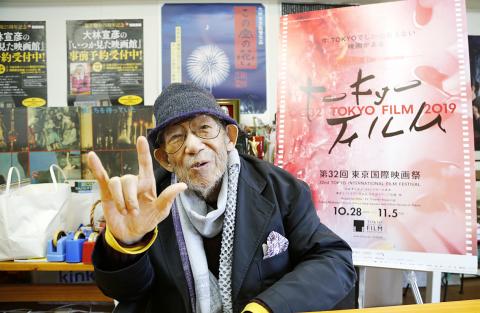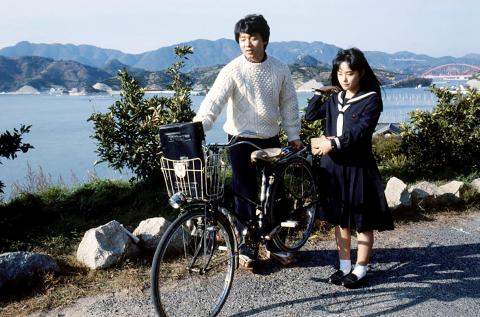At 81, Nobuhiko Obayashi has terminal lung cancer, but his confrontation with death began so long ago it has characterized his decades of filmmaking.
Obayashi has stayed true to himself through more than 40 movies and thousands of TV shows, commercials and other video, devoted to warning of the horrors of war.
“I’ve been doing the same thing and never wavered,” Obayashi said at his Tokyo office, appearing frail in a wheelchair but his eyes bright with a mischievous energy.

Photo: AP
The works reflect that he grew up during World War II, years remembered for Japan’s aggression and atrocities against its neighbors but also a period during which Japanese people suffered hunger, abuse and mass death.
“Someone could push the button any minute,” he added, tapping on his desk as an imaginary switch to set off a nuclear bomb.
His voice, gentle and raspy, reflected his conviction, as he stressed in a recent interview how he believed in the power of movies. Movies like his, he says, ask that important question: Where do you stand?

Photo: AP
“Movies are not weak,” he said, looking offended at such an idea. “Movies express freedom.”
He has never made a single film to make money, be famous or pander favors, he said, not hiding his pride.
Obayashi, who has helped define the legacy of Japanese filmmaking, is being honored at the Tokyo International Film Festival, opening on Monday and running through Nov. 5.
“Obayashi has been dubbed a ‘cinematic magician’ for his dreamlike visual expression,” the festival said in a statement.
Among the Obayashi works being screened is his just-completed, three-hour Labyrinth of Cinema, characteristically anti-war but also an homage to filmmaking. The main characters — young Japanese men who go to an old movie theater but increasingly get sucked into crises — have names emulating cinematic giants, Francois Truffaut, Mario Bava and Don Seigel.
Also being shown is 1985’s Miss Lonely, shot in seaside Onomichi, the picturesque town in Hiroshima prefecture where Obayashi grew up. Onomichi is also the site of Yasujiro Ozu’s classic Tokyo Story.
Kaleidoscopic in gorgeous imagery, Obayashi films are filled with what have become his trademark motifs — colorful Japanese festivals, dripping blood, marching doll-like soldiers, shooting stars and winding cobblestone roads — all with a faraway fairy-tale feel.
Obayashi showed an interest in films from childhood and made animation clips by hand.
His pacifism was reinforced early by his father, who was an army doctor. His father used to say doctors can save not only their fellow countrymen but enemy lives as well, Obayashi recalled. When Obayashi decided to be a filmmaker, his father gave him an 8-millimeter camera.
Obayashi believes the masterpieces that propelled Akira Kurosawa to stardom like Seven Samurai and Yojimbo were overly commercial, while his late-career works of slum-set Dodeskaden and Rhapsody in August, about the suffering caused by the Nagasaki atomic bombing, were true Kurosawa films.
Obayashi recalled that Kurosawa, whom he lovingly called “Kuro-san,” was aware of such points, and had remarked how Obayashi made from-the-heart films.
Unlike many Hollywood movies, Obayashi’s works lack an obvious plot of a hero fighting a villain. Like many Japanese films, they don’t rely on an action-packed plot that drives toward a climactic resolution.
Instead, his movies appear to start from nowhere and end, then start up again, weaving in and out of scenes, often traveling in time as well.
When asked if war is the villain for mankind, Obayashi looks as if he thinks he has been asked a dumb question.
For him, what people throughout history have faced is complex. A soldier may be killed but he may also kill, he said.
Obayashi is working on his next film. He acknowledged it might take time, given his health. To demonstrate his lifetime goal for his filmmaking, he showed his hand, three fingers held up in the sign language of “I love you.”
“Let’s value freedom with all our might. Let’s have no lies,” said Obayashi.

On April 26, The Lancet published a letter from two doctors at Taichung-based China Medical University Hospital (CMUH) warning that “Taiwan’s Health Care System is on the Brink of Collapse.” The authors said that “Years of policy inaction and mismanagement of resources have led to the National Health Insurance system operating under unsustainable conditions.” The pushback was immediate. Errors in the paper were quickly identified and publicized, to discredit the authors (the hospital apologized). CNA reported that CMUH said the letter described Taiwan in 2021 as having 62 nurses per 10,000 people, when the correct number was 78 nurses per 10,000

As we live longer, our risk of cognitive impairment is increasing. How can we delay the onset of symptoms? Do we have to give up every indulgence or can small changes make a difference? We asked neurologists for tips on how to keep our brains healthy for life. TAKE CARE OF YOUR HEALTH “All of the sensible things that apply to bodily health apply to brain health,” says Suzanne O’Sullivan, a consultant in neurology at the National Hospital for Neurology and Neurosurgery in London, and the author of The Age of Diagnosis. “When you’re 20, you can get away with absolute

May 5 to May 11 What started out as friction between Taiwanese students at Taichung First High School and a Japanese head cook escalated dramatically over the first two weeks of May 1927. It began on April 30 when the cook’s wife knew that lotus starch used in that night’s dinner had rat feces in it, but failed to inform staff until the meal was already prepared. The students believed that her silence was intentional, and filed a complaint. The school’s Japanese administrators sided with the cook’s family, dismissing the students as troublemakers and clamping down on their freedoms — with

As Donald Trump’s executive order in March led to the shuttering of Voice of America (VOA) — the global broadcaster whose roots date back to the fight against Nazi propaganda — he quickly attracted support from figures not used to aligning themselves with any US administration. Trump had ordered the US Agency for Global Media, the federal agency that funds VOA and other groups promoting independent journalism overseas, to be “eliminated to the maximum extent consistent with applicable law.” The decision suddenly halted programming in 49 languages to more than 425 million people. In Moscow, Margarita Simonyan, the hardline editor-in-chief of the